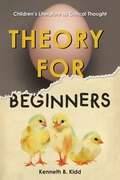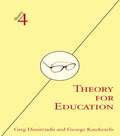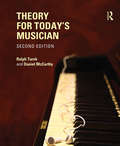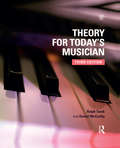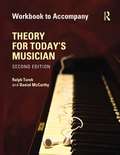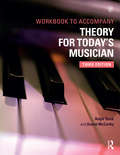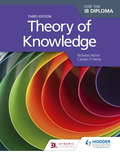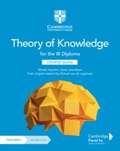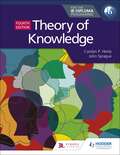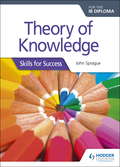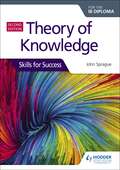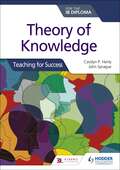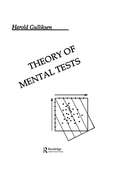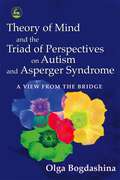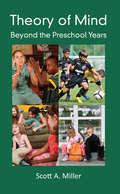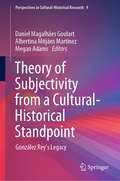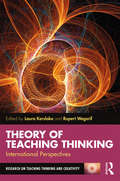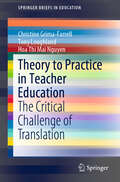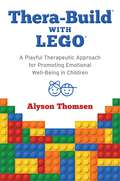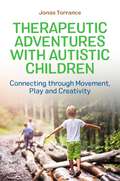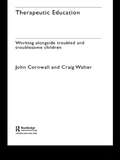- Table View
- List View
Theory for Beginners: Children’s Literature as Critical Thought
by Kenneth B. KiddSince its inception in the 1970s, the Philosophy for Children movement (P4C) has affirmed children’s literature as important philosophical work. Theory, meanwhile, has invested in children’s classics, especially Lewis Carroll’s Alice books, and has also developed a literature for beginners that resembles children’s literature in significant ways. Offering a novel take on this phenomenon, Theory for Beginners explores how philosophy and theory draw on children’s literature and have even come to resemble it in their strategies for cultivating the child and/or the beginner. Examining everything from the rise of French Theory in the United States to the crucial pedagogies offered in children’s picture books, from Alison Bechdel’s graphic memoir Are You My Mother? and Lemony Snicket’s A Series of Unfortunate Events to studies of queer childhood, Kenneth B. Kidd deftly reveals the way in which children may learn from philosophy and vice versa.
Theory for Education: Adapted from Theory for Religious Studies, by William E. Deal and Timothy K. Beal (theory4)
by George Kamberelis Greg DimitriadisTheory for Education provides a concise and clear introduction to key contemporary theorists, including their lives, major works and ideas. Written for the student in need of a quick introduction or for the scholar brushing up on details, this new volume in the theory4 series presents major thinkers whose work and ideas have shaped critical thinking in our time. Greg Dimitriadis and George Kamberelis underscore the particular relevance of these thinkers for the field of education - their work on education, how others in education have used them and possible future directions for teachers and researchers. Theory for Education's ease of use, clarity and comprehensive scope will be invaluable for those entering the field. Adapted from Theory for Religious Studies, by William E. Deal and Timothy K. Beal.
Theory for Today's Musician
by Ralph Turek Daniel McCarthyThe package (ISBN 978-0-415-73036-5) contains the second edition of Theory for Today’s Musician (ISBN: 978-0-415-66332-8) and the Theory for Today’s Musician Workbook (ISBN: 978-0-415-66333-5). The package is available for print books only. Ebook users should purchase the textbook and workbook separately. Theory for Today’s Musician, Second Edition, recasts the scope of the traditional music theory course to meet the demands of the professional music world, in a style that speaks directly and engagingly to today’s music student. It uses classical, folk, popular, and jazz repertoires with clear explanations that link music theory to musical applications. The authors help prepare students by not only exploring how music theory works in art music, but how it functions within modern music, and why this knowledge will help them become better composers, music teachers, performers, and recording engineers. This broadly comprehensive text merges traditional topics such as part-writing and harmony (diatonic, chromatic, neo-tonal and atonal), with less traditional topics such as counterpoint and musical process, and includes the non-traditional topics of popular music songwriting, jazz harmony and the blues. Written by an experienced textbook author and new co-author, both active classroom teachers for many years, Theory for Today’s Musician is the complete and ideal theory text to enable today’s student to accomplish their musical goals tomorrow. New Features to the Second Edition: An expanded unit on form that includes introductory chapters on sonata & rondo, to prepare students for learning form New "Back to Basics" online drills, keyed to the text, allowing students to brush up their fundamentals as needed New musical examples, including over 80 new musical excerpts from both art and popular music repertoires Expanded in-chapter exercises to promote and facilitate classroom interaction Carefully edited in response to market demands to create a more streamlined, flexible text New audio of musical examples (for both text and workbook), 50% re-recorded for improved audio quality An updated and relocated Chapter 33 on song composition in the jazz and popular folk styles, applying principles of text setting, melody composition/harmonization Companion website that houses online tutorial with drills of basic concepts
Theory for Today's Musician Textbook,
by Ralph Turek Daniel McCarthyTheory for Today’s Musician, Third Edition, recasts the scope of the traditional music theory course to meet the demands of the professional music world, in a style that speaks directly and engagingly to today’s music student. It uses classical, folk, popular, and jazz repertoires with clear explanations that link music theory to musical applications. The authors help prepare students by not only exploring how music theory works in art music, but how it functions within modern music, and why this knowledge will help them become better composers, music teachers, performers, and recording engineers. <P><P> This broadly comprehensive text merges traditional topics such as part writing and harmony (diatonic, chromatic, neo-tonal and atonal), with less traditional topics such as counterpoint and musical process, and includes the non-traditional topics of popular music songwriting, jazz harmony and the blues. The accompanying companion website provides interactive exercises that allow students to practice foundational theory skills. Written by experienced authors, both active classroom teachers for many years, Theory for Today’s Musician is the complete and ideal theory text to enable today’s student to accomplish their musical goals tomorrow. Updated and corrected throughout, the Third Edition includes: Expanded coverage of atonality and serialism, now separated into two chapters. Broadened treatment of cadences, including examples from popular music. Substantially rewritten chapter on songwriting. Interactive features of the text simplified to two types, "Concept Checks" and "Review and Reinforcement," for greater ease of use. New and updated musical examples added throughout. Charts, illustrations, and musical examples revised for increased clarity. Audio of musical examples now provided through the companion website. The accompanying Workbook offers exercises and assignments to accompany each chapter in the book. A companion website houses online tutorials with drills of basic concepts, as well as audio.
Theory for Today's Musician Workbook, Second Edition (eBook)
by Ralph Turek Daniel McCarthyThe package (ISBN 978-0-415-73036-5) contains the second edition of Theory for Today’s Musician (ISBN: 978-0-415-66332-8) and the Theory for Today’s Musician Workbook (ISBN: 978-0-415-66333-5). The package is available for print books only. Ebook users should purchase the textbook and workbook separately. This workbook accompanies the second edition of Theory for Today's Musician and is full of exercises to help students practice and master the concepts presented in each chapter. Audio files are included.
Theory for Today's Musician Workbook, Third Edition
by Ralph Turek Daniel McCarthyTheory for Today’s Musician, Third Edition, recasts the scope of the traditional music theory course to meet the demands of the professional music world, in a style that speaks directly and engagingly to today’s music student. It uses classical, folk, popular, and jazz repertoires with clear explanations that link music theory to musical applications. The authors help prepare students by not only exploring how music theory works in art music, but how it functions within modern music, and why this knowledge will help them become better composers, music teachers, performers, and recording engineers. This broadly comprehensive text merges traditional topics such as part writing and harmony (diatonic, chromatic, neo-tonal and atonal), with less traditional topics such as counterpoint and musical process, and includes the non-traditional topics of popular music songwriting, jazz harmony and the blues. The accompanying companion website provides interactive exercises that allow students to practice foundational theory skills. Written by experienced authors, both active classroom teachers for many years, Theory for Today’s Musician is the complete and ideal theory text to enable today’s student to accomplish their musical goals tomorrow. Updated and corrected throughout, the Third Edition includes: Expanded coverage of atonality and serialism, now separated into two chapters. Broadened treatment of cadences, including examples from popular music. Substantially rewritten chapter on songwriting. Interactive features of the text simplified to two types, "Concept Checks" and "Review and Reinforcement," for greater ease of use. New and updated musical examples added throughout. Charts, illustrations, and musical examples revised for increased clarity. Audio of musical examples now provided through the companion website. The accompanying Workbook offers exercises and assignments to accompany each chapter in the book. A companion website houses online tutorials with drills of basic concepts, as well as audio.
Theory of Decision under Uncertainty
by Itzhak GilboaThis book describes the classical axiomatic theories of decision under uncertainty, as well as critiques thereof and alternative theories. It focuses on the meaning of probability, discussing some definitions and surveying their scope of applicability. The behavioral definition of subjective probability serves as a way to present the classical theories, culminating in Savage's theorem. The limitations of this result as a definition of probability lead to two directions - first, similar behavioral definitions of more general theories, such as non-additive probabilities and multiple priors, and second, cognitive derivations based on case-based techniques.
Theory of Knowledge Third Edition
by Nicholas Alchin Carolyn HenlyA unique narrative through the latest TOK guide from two of the IB's most respected experts- Guides students by helping them examine the nature of knowledge and ways of knowing- Develops diverse and balanced arguments by raising questions in a variety of contexts- Provides complete support assessment- Includes all the new ways of knowing and areas of knowledgeAlso availableThis Student's Book is supported by Dynamic Learning, which offers Teaching and Learning Resources that include a guide to teaching the course and classroom activities, plus a unique lesson builder tool to help teachers collate and organise a range of resources into lessons. The Dynamic Learning package also includes a Whiteboard eTextbook version of the book for front of class teaching and lesson planning.Also from later in the year, please look out for assignable and downloadable Student eTextbooks
Theory of Knowledge for the IB Diploma Course Guide
by Wendy Heydorn Susan JesudasonHelp your students to flourish as knowers with this updated series for first examination 2022. Written by experienced authors and examiners, this third edition encourages students to explore 'What is knowledge? Why, and how do we learn?'. This print and digital course guide helps shape students into internationally minded citizens as they critically assess the world around them. Students will explore real-world examples and independently reflect on their knowledge, growing as knowers. A dedicated chapter focuses on building skills for assessment, so students will be fully prepared to excel in the essay and exhibition.
Theory of Knowledge for the IB Diploma Fourth Edition
by John Sprague Carolyn P. HenlyDeveloped in cooperation with the International Baccalaureate (IB)Build knowledge with this thought-provoking guide through the core theme, the five optional themes and the five areas of knowledge.- Guide students by helping them examine the nature of knowledge and their own status as a knower.- Develop diverse and balanced arguments with a variety of activities, case studies and Deeper Thinking features.- Aid understanding with in-depth discussions of the twelve course concepts and detailed definitions of all key terms.- Provide assessment support with guidance relating to the TOK Exhibition and Essay.Free online material available at hoddereducation.com/ib-extrasAlso available:Theory of Knowledge Student eTextbook 9781510475458Theory of Knowledge Whiteboard eTextbook 9781510475441Theory of Knowledge: Teaching for Success 9781510474659Theory of Knowledge: Skills for Success 9781510474956Theory of Knowledge: Skills for Success Student eTextbook 9781510475472
Theory of Knowledge for the IB Diploma Fourth Edition
by John Sprague Carolyn P. HenlyDeveloped in cooperation with the International Baccalaureate (IB)Build knowledge with this thought-provoking guide through the core theme, the five optional themes and the five areas of knowledge.- Guide students by helping them examine the nature of knowledge and their own status as a knower.- Develop diverse and balanced arguments with a variety of activities, case studies and Deeper Thinking features.- Aid understanding with in-depth discussions of the twelve course concepts and detailed definitions of all key terms.- Provide assessment support with guidance relating to the TOK Exhibition and Essay.Free online material available at hoddereducation.com/ib-extrasAlso available:Theory of Knowledge Student eTextbook 9781510475458Theory of Knowledge Whiteboard eTextbook 9781510475441Theory of Knowledge: Teaching for Success 9781510474659Theory of Knowledge: Skills for Success 9781510474956Theory of Knowledge: Skills for Success Student eTextbook 9781510475472
Theory of Knowledge for the IB Diploma: Skills for Success
by John SpragueBuild confidence in a range of key Theory of Knowledge skills with this practical companion, full of advice and guidance from an experienced TOK expert.· Build confidence in applying analytical skills with Deeper Analysis, showing you how to go beyond simply identifying and explaining· Develop awareness of the practical application of knowledge with In Practice pointers, offering guidance on how topics can be used in TOK activities· Improve skills for formulating genuine knowledge questions for use in activities, a crucial part of assessment success· Avoid making the mistakes that others make in the assessment with TOK Traps that highlight common errors and misconceptions.
Theory of Knowledge for the IB Diploma: Skills for Success
by John SpragueBuild confidence in a range of key Theory of Knowledge skills with this practical companion, full of advice and guidance from an experienced TOK expert.- Learn to apply analytical skills with Deeper Thinking, showing you how to go beyond simply identifying and explaining.- Develop awareness of the practical application of knowledge with In Practice pointers, offering guidance on how topics can be used in TOK activities.- Improve your ability to respond to knowledge questions, a crucial part of assessment success.- Avoid making the mistakes that others make in the assessments with TOK Traps that highlight common errors and misconceptions.Also available:Theory of Knowledge for the IB Diploma 9781510474314Theory of Knowledge Student eTextbook 9781510475458Theory of Knowledge Whiteboard eTextbook 9781510475441Theory of Knowledge: Teaching for Success 9781510474659Theory of Knowledge: Skills for Success Student eTextbook 9781510475472
Theory of Knowledge for the IB Diploma: Skills for Success
by John SpragueBuild confidence in a range of key Theory of Knowledge skills with this practical companion, full of advice and guidance from an experienced TOK expert.- Learn to apply analytical skills with Deeper Thinking, showing you how to go beyond simply identifying and explaining.- Develop awareness of the practical application of knowledge with In Practice pointers, offering guidance on how topics can be used in TOK activities.- Improve your ability to respond to knowledge questions, a crucial part of assessment success.- Avoid making the mistakes that others make in the assessments with TOK Traps that highlight common errors and misconceptions.Also available:Theory of Knowledge for the IB Diploma 9781510474314Theory of Knowledge Student eTextbook 9781510475458Theory of Knowledge Whiteboard eTextbook 9781510475441Theory of Knowledge: Teaching for Success 9781510474659Theory of Knowledge: Skills for Success Student eTextbook 9781510475472
Theory of Knowledge for the IB Diploma: Teaching for Success
by John Sprague Carolyn P. HenlyConfidently navigate the new syllabus with a variety of teaching resources to help you plan engaging lessons that are directly aligned with the Student Book.- Confidently teach the new course with a clear overview of the TOK course and your responsibilities as a TOK teacher.- Ensure full coverage of the syllabus with specific guidance relating to the core theme, the optional themes and the areas of knowledge.- Easily navigate the new course with lesson plans, activities and extension material.- Help guide students through the assessment process with advice relating to the exhibition and essay.
Theory of Knowledge for the IB Diploma: Teaching for Success
by John Sprague Carolyn P. HenlyConfidently navigate the new syllabus with a variety of teaching resources to help you plan engaging lessons that are directly aligned with the Student Book.- Confidently teach the new course with a clear overview of the TOK course and your responsibilities as a TOK teacher.- Ensure full coverage of the syllabus with specific guidance relating to the core theme, the optional themes and the areas of knowledge.- Easily navigate the new course with lesson plans, activities and extension material.- Help guide students through the assessment process with advice relating to the exhibition and essay.
Theory of Mental Tests
by Harold GulliksenThis classic volume outlines, for both students and professionals, the mathematical theories and equations that are necessary for evaluating a test and for quantifying its characteristics. The author utilizes formulas that evaluate both the reliability and the validity of tests. He also provides the means for evaluating the reliability and validity of total test scores and individual item analysis. The work remains one of the only books on classical test theory to discuss applications, "true score" theory, the effect of test length on reliability and validity, and the effects of univariate and multivariate selection on validity.
Theory of Mind and the Triad of Perspectives on Autism and Asperger Syndrome: A View from the Bridge
by Olga BogdashinaInspired by the often uncomfortable interplay between autistic individuals, parents and professionals in understanding autistic spectrum conditions, Olga Bogdashina uses the concept of Theory of Mind (ToM) to consider these groups' different (and often conflicting) perspectives. ToM is the ability to imagine and make judgements about what others feel and think; its absence in autistic individuals is called 'mindblindness'. This book addresses the 'mindblindness' of people united in their interest in autism but divided by their different angles and perspectives. Divided into four parts, the book first defines autism, then the views of the three main groups working with it - autistic individuals, parents and professionals - under the headings of classifications, diagnosis, causes, development, theories and treatment. By comparing and reconciling the different perspectives in this way, the book helps each group to understand and predict each other's responses and behaviours. This enlightening and innovative book offers a unique way of 'stepping in each other's shoes' and is a valuable resource for all people living or working with autism.
Theory of Mind: Beyond the Preschool Years
by Scott A. MillerThis is the first book to provide a comprehensive review of the burgeoning literature on theory of mind (TOM) after the preschool years and the first to integrate this literature with other approaches to the study of social understanding. By highlighting the relationship between early and later developments, the book provides readers with a greater understanding of what we know and what we still need to know about higher-order TOM. Although the focus is on development in typical populations, development in individuals with autism and in older adults is also explored to give readers a deeper understanding of possible problems in development. Examining the later developments of TOM gives readers a greater understanding of: Developments that occur after the age of 5. Individual differences in rate of development and atypical development and the effects of those differences. The differences in rate of mastery which become more marked, and therefore more informative, with increased age. What it means to have a “good theory of mind.” The differences between first- and second- order theory of mind development in preschoolers, older children, adolescents, and adults. The range of beliefs available to children at various ages, providing a fuller picture of what is meant by “understanding of belief.” After the introduction, the literature on first-order developments during the preschool period is summarized to serve as a backdrop for understanding more advanced developments. Chapter 3 is devoted to the second-order false belief task. Chapters 4 and 5 introduce a variety of other measures for understanding higher-level forms of TOM thereby providing readers with greater insight into other cognitive and social developmental outcomes. Chapter 6 discusses the relation between children’s TOM abilities and other aspects of their development. Chapters 7 and 8 place the work in a historical context. First, the research on the development of social and mental worlds that predated the emergence of TOM is examined. Chapter 8 then provides a comparative treatment of the two literatures and how they complement one another. Ideal as a supplement in graduate or advanced undergraduate courses in theory of mind, cognitive development, or social development taught in psychology and education. Veteran researchers will also appreciate this book‘s unique synthesis of this critical research.
Theory of Subjectivity from a Cultural-Historical Standpoint: González Rey’s Legacy (Perspectives in Cultural-Historical Research #9)
by Albertina Mitjáns Martínez Daniel Magalhães Goulart Megan AdamsThis book examines key ideas related to the Theory of Subjectivity within a cultural-historical approach. It brings together the intellectual contributions made by Professor Fernando González Rey (1949–2019) towards understanding human subjectivity, and emphasizing their unfolding in different fields and contexts. The book addresses the genesis and development of González Rey’s work, articulating this discussion with the author’s biography. González Rey’s main scientific contribution is the Theory of Subjectivity in a cultural-historical perspective, which is inseparable from Qualitative Epistemology and from its constructive-interpretive methodological expression. The book presents and discusses González Rey’s contributions to different contexts and fields, such as psychological research, education, cultural-historical psychology, human development, motivation, human health and psychotherapy. This book brings together examples of how these ideas have been employed and developed in different fields and contexts.
Theory of Teaching Thinking: International Perspectives (Research on Teaching Thinking and Creativity)
by Rupert Wegerif Laura KerslakeAcross the world education for 'thinking’ is seen as the key to thriving in an increasingly complex, globalised, technological world. The OECD suggests that teaching thinking is key to growing a more successful economy; others claim it is needed for increased democratic engagement and well-being. Theory of Teaching Thinking discusses what is meant by ‘thinking’ in the context of teaching and takes a global perspective incorporating contributions from neurocognitive, technological, Confucian, philosophical, and dialogical viewpoints. Questions explored throughout this edited volume include: what is thinking? how can thinking be taught? what does ‘better thinking’ mean, and how can we know it if we see it? what is the impact on wider society when thinking is taught in the classroom? Extensively researched and at the cutting edge of this field, this book provides the context for teaching thinking that researchers, teachers, and policy-makers need. As the first book in a brand new series, Research on Teaching Thinking and Creativity, it is a much-needed introduction and guide to this critical subject.
Theory to Practice in Teacher Education: The Critical Challenge of Translation (SpringerBriefs in Education)
by Christine Grima-Farrell Hoa Thi Nguyen Tony LoughlandThis book offers a theoretically and empirically robust account of what is known about the effective approaches that translate theory to practice in teacher education, presenting evidence from case studies from a diverse range of contexts informed by various methodological foundations. It also provides accounts that support teacher educators involved in both school and university based teacher education.The book offers insights into the translation of theory to practice from the long history of teacher education, the benefit of diverse approaches in terms of the effectiveness of initial teacher education, and the impact of professional standards.
Thera-Build® with LEGO®: A Playful Therapeutic Approach for Promoting Emotional Well-Being in Children
by Alyson Thomsen'Thera-Build' is a LEGO®-based therapeutic approach for improving children's emotional well-being. Participation in Thera-Build groups can help to boost self-esteem, address common issues such as anxiety and anger, support social development and build positive attachments. This inspiring and user-friendly guide explores the power of play, introduces the basics of brain plasticity and attachment theory, and shows exactly how to set up and run an effective Thera-Build group. A wide range of imaginative games and activities is included.
Therapeutic Adventures with Autistic Children: Connecting through Movement, Play and Creativity
by Jonas TorranceA vivid exploration of working with autistic children using empowering techniques from a range of creative therapies. Each chapter in this heartening book is the story of a child with autism and how therapy was pivotal in confronting his or her individual dilemma. Covering many of the behaviours characteristic to autism, such as uncontrolled anger and obsessive tendencies, the therapies used range from drawing and dancing to meditation and martial arts, depending on the needs and interests of each child. The key message is that investing in the relationship between the therapist and the child - so that they grow, play and develop together - is transformative.
Therapeutic Education: Working alongside troubled and troublesome children
by John Cornwall Craig WalterThe role of therapy in schools is a topic that has been significantly under-researched and often overlooked. Considering the number of students in full-time education with serious emotional and behavioural difficulties, the skills and tricks used by therapists can be usefully passed on to teachers in the classroom. This book traces a substantial four-year project that applied the principles of therapeutic education in one school setting and exposed how current educational contexts actually contribute to disaffection and disruption of young people's learning. The authors propose a practical model of school and curricular experience, based on therapeutic relationships, that has led to outstanding positive results in school development. With suugestions throughout for tried-and-tested strategies that really work, this book will help professionals turn troubled young people's experience of education from the nightmare it often is, into an adventure with positive results for lifelong learning.
